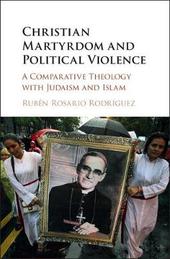
|
Christian Martyrdom and Political Violence: A Comparative Theology with Judaism and Islam
Hardback
Main Details
| Title |
Christian Martyrdom and Political Violence: A Comparative Theology with Judaism and Islam
|
| Authors and Contributors |
By (author) Ruben Rosario Rodriguez
|
| Physical Properties |
| Format:Hardback | | Pages:318 | | Dimensions(mm): Height 235,Width 160 |
|
| Category/Genre | Comparative religion
Christian theology
Islam
Judaism
Theology |
|---|
| ISBN/Barcode |
9781107187146
|
| Classifications | Dewey:261.2 |
|---|
| Audience | | Tertiary Education (US: College) | |
|---|
| Illustrations |
Worked examples or Exercises
|
|
Publishing Details |
| Publisher |
Cambridge University Press
|
| Imprint |
Cambridge University Press
|
| Publication Date |
13 July 2017 |
| Publication Country |
United Kingdom
|
Description
In recent years, martyrdom and political violence have been conflated in the public imagination. Ruben Rosario Rodriguez argues that martyr narratives deserve consideration as resources for resisting political violence in contemporary theological reflection. Underlying the three Abrahamic monotheistic traditions is a shared belief that God requires liberation for the oppressed, justice for the victims and, most demanding of all, love for the political enemy. Christian, Jewish and Muslim martyr narratives that condone political violence - whether terrorist or state-sponsored - are examined alongside each religion's canon, in order to evaluate how central or marginalized these discourses are within their respective traditions. Primarily a work of Christian theology in conversation with Judaism and Islam, this book aims to model religious pluralism and cooperation by retrieving distinctly Christian sources that nurture tolerance and facilitate coexistence, while respecting religious difference.
Author Biography
Ruben Rosario Rodriguez is Associate Professor of Systematic Theology in the Department of Theological Studies at St Louis University, Missouri. His first book, Racism and God-Talk: A Latino/a Perspective (2008), won the 2011 Alpha Sigma Nu Book Award for Theology. He has contributed to two recent collections, The Wiley Blackwell Companion to Latino/a Theology (2015) and Immigrant Neighbors among Us: Immigration across Theological Traditions (2015), and is editor for the forthcoming T&T Clark Companion to Political Theology.
Reviews'This is an exceptional academic contribution to the historical study of martyrdom among the classic Abrahamic religions, but also to its contemporary religious, political, and cultural relevance. It is a highly ambitious project that will leave an enduring mark in the always pertinent field of religiosity and human sacrifice. I strongly recommend its careful and critical reading.' Luis N. Rivera-Pagan, Henry Winters Luce Professor in Ecumenics Emeritus, Princeton Theological Seminary, New Jersey 'Christian Martyrdom and Political Violence is a serious and important work in constructive Christian theological ethics, intending to rescue the concept of martyrdom from contemporary corruptions - corruptions so grave that the very concept of martyrdom risks being discredited. This is a groundbreaking book which I recommend highly.' Rev. David P. Gushee, Distinguished Professor of Christian Ethics and Director of the Center for Theology and Public Life, Mercer University, Georgia 'Rosario-Rodriguez's attempt at a fundamental theology built around the narratives of martyrdom is a remarkable synthesis of long and serious work in the fields of liberation theology, biblical studies, systematics, interreligious dialogue, 'world church' studies, and moral theology; it is something truly new, and opens a whole fertile field of inquiry. I am especially impressed by the care and integrity with which he approaches Islamic martyr narratives without either assimilating them to the Christian narratives or creating a false partition between their theological meanings.' David Hart, Fellow of The Notre Dame Institute for Advanced Studies 'Not only does this book offer a knowledgeable and self-critical reconstruction of the concept of Christian martyrdom, it also makes a plea for a living Christian witness in the globalized world of the twenty-first century.' Paul Schroffner, translated from Zeitschrift fur katholische Theologie 'Chapter 3, probably the strongest chapter, discusses the meaning of martyrs and martyrdom in the Jewish and Muslim Scriptures, in 'conversation with the book's central narrative about Christian martyrdom as nonviolent political resistance'. There is a very careful analysis of the Muslim interpretation of jihad ('struggle'), along with the Christian concept of just war. This chapter also offers a trenchant critique of Christian Zionism, along with Islamist violence, Israeli nationalism, and misuse of just war theory in the American 'war on terror'. These, Rosario Rodriguez asserts, do not reflect their parent traditions, but rather 'imperialist ideologies', like that of ancient Rome, which Christian martyrdom attempted to subvert.' Journal of Religion and Violence '[Ruben Rosario] Rodriguez astutely emphasizes that only forgiveness modeled on that of Jesus will break the cycle of violence. This book is an exemplary effort to sort out how a Christian comparative theology of martyrdom would appear. Ultimately, no religion can justify itself without reference to other religions which accompany it through history, sometimes peacefully and sometimes as antagonists. The author has credibly demonstrated that a viable Christian theology of martyrdom can be written and has honored the memory of its witnesses.' Michael T. McLauglin, Reading Religion 'For scholars of Christian ethics ... [Ruben Rosario Rodriguez] demonstrates that liberation theology is an essential literature for Christian ethics in the twenty-first century with almost unprecedented persuasion. With derision for 'contextual theology,' many Christian ethicists continue to doubt liberation theology's capacity to speak to our most urgent global problems. Rosario's work ought to disabuse the field of this shallow dismissal, demonstrating liberation theology's enormous potential to grapple with the problem of political violence across religious traditions.' Nichole M. Flores, Journal of the Society of Christian Ethics
|